| Srl | Item |
| 1 |
ID:
098363
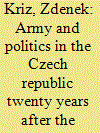

|
|
|
|
|
| Publication |
2010.
|
| Summary/Abstract |
This article focuses on relations between army and politics in the Czech Republic after the 1989 Velvet Revolution. This article concludes that these relations in the Czech Republic achieved the parameters typical of consolidated democracies. The many problems that continue to exist in this area in the Czech Republic do not in any significant way deviate from what is typical of consolidated democracies. Therefore, the transformation of civil -military relations can be regarded as successful.
|
|
|
|
|
|
|
|
|
|
|
|
|
|
|
|
| 2 |
ID:
098366
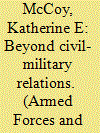

|
|
|
|
|
| Publication |
2010.
|
| Summary/Abstract |
This article applies the problem of civilian control over the military to the realm of private military contractors. The author argues that military outsourcing strips the principal -agent relationship of many of the structures and dynamics that states have traditionally used to control militaries. Many of the same qualities that make private military corporations successful as both economic actors and political surrogates also lead to reductions in the possibility for effective civilian control. The author supports these claims through an examination of the multilevel, fragmented, and global nature of the private military corporation market, with particular attention to divisions within the labor force. The implications of this analysis are that using private military corporations raises persistent challenges and tensions for effective state control that cannot be easily regulated away.
|
|
|
|
|
|
|
|
|
|
|
|
|
|
|
|
| 3 |
ID:
098361
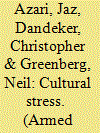

|
|
|
|
|
| Publication |
2010.
|
| Summary/Abstract |
The purpose of this article is to expand civil-military and military health research's concepts of stress with the addition of a theoretical construct of the concept known as "cultural stress." Military research often discusses combat and operational stress and its effect on soldiers but does not address unique culturally induced stressors created by the modern military's interaction with indigenous populations. Civilian research discusses stress as it relates to "culture shock" but does not account for unique pressures facing servicemen in both peacetime and wartime environments. This article synthesizes these concepts to produce a new conceptual basis of "cultural stress" from which further empirical research can be conducted.
|
|
|
|
|
|
|
|
|
|
|
|
|
|
|
|
| 4 |
ID:
098364


|
|
|
|
|
| Publication |
2010.
|
| Summary/Abstract |
These comments introduce a partial literature review of privatization as has appeared in our journal as well as four articles that represent some of the work of social scientists, military and agency personnel, private contractors, and others who participated in a forum on privatization held at St. Mary's College in Maryland in 2008. The forum is a program of their Center for the Study of Democracy and The Patuxent Partnership. The 2008 conference was entitled ''The Privatization of National Defense.
|
|
|
|
|
|
|
|
|
|
|
|
|
|
|
|
| 5 |
ID:
098368
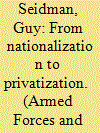

|
|
|
|
|
| Publication |
2010.
|
| Summary/Abstract |
In recent years the use of private military contractors to execute national security tasks in the U.S. military has finally come under public scrutiny. The main policy question is in three parts: What is the proper division of labor between the public and private sectors? Who decides which sector performs a specific task? If private operatives perform tasks that typically fall on the public side (combat, interrogation), what is the public oversight over the private actors, and how can they be held accountable for wrongdoings? In this article these questions are addressed in relation to the privatization process in the Israeli Defense Forces (IDF). The article has four parts: the first suggests that the Israeli baseline is unique as the IDF has historically been entrusted with a wide array of national-civilian missions; the second explains the economic realities that probably lie behind the privatization efforts; the third describes the slow and cautious privatization process currently under way; the fourth suggests that while there is little public debate, there is civilian oversight, there are some publicly exposed rationales, and there is public support in letting the IDF, the most trusted part of the executive branch, control the process.
|
|
|
|
|
|
|
|
|
|
|
|
|
|
|
|
| 6 |
ID:
098362
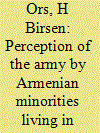

|
|
|
| 7 |
ID:
098365


|
|
|
|
|
| Publication |
2010.
|
| Summary/Abstract |
The Department of Defense (DoD) has contracted defense support operations to private U.S. and foreign firms in an ever-increasing manner in both Iraq and Afghanistan. Significant factors that have contributed to this outsourcing include the proliferation of military operations, the increased sophistication of U.S. weapons systems used in these operations, and a reduction in the size of the U.S. military after the breakup of the former Soviet Union. The concerns raised with this process have centered on contract management and oversight. Despite the fact that DoD has continually updated its written guidance to defense officials charged with oversight of contractor performance, DoD has faced continuing problems related to a lack of visibility over the totality of contractor support at deployed locations, a lack of adequate contract oversight personnel, and the failure to collect and share institutional knowledge on the use of certain contractors.
|
|
|
|
|
|
|
|
|
|
|
|
|
|
|
|
| 8 |
ID:
098367
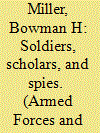

|
|
|
|
|
| Publication |
2010.
|
| Summary/Abstract |
The worlds of intelligence, the military, and academe reflect very different, at times conflicting, cultures, ethical norms, and priorities. This examination assesses the evolution of the sometimes fractious relationship between scholars and government military and intelligence officials, disputes among them, and cases of convergence and critical collaboration.To be effective in policy and decision making, the U.S. government needs the best information and thinking it can obtain. Much of that expertise resides in academia. For their part, social scientists and members of the healing professions, in particular, must be attentive to the moral, intellectual, and ethical dictates of their professions when participating in support of government employment of coercive military force and extraordinary means of intelligence acquisition. Finding the appropriate balance between helping safeguard national security and upholding the tenets of professional integrity is a joint task of soldiers, scholars, and spies.
|
|
|
|
|
|
|
|
|
|
|
|
|
|
|
|